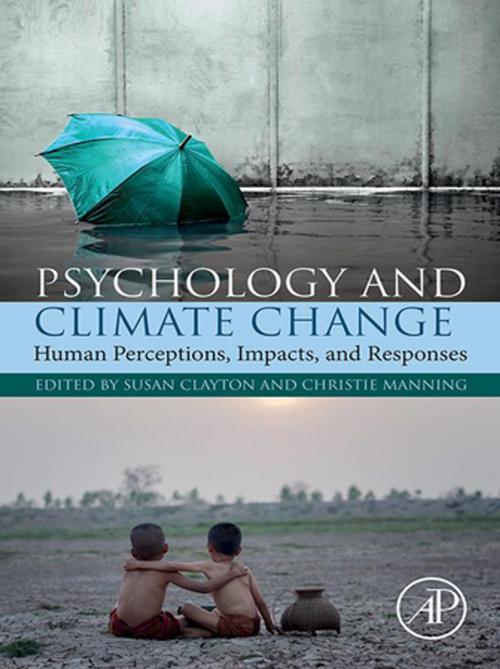Psychology and Climate Change
Human Perceptions, Impacts, and Responses
Nonfiction, Health & Well Being, Psychology, Applied Psychology, Social Psychology, Social & Cultural Studies, Political Science| Author: | ISBN: | 9780128131312 | |
| Publisher: | Elsevier Science | Publication: | June 5, 2018 |
| Imprint: | Academic Press | Language: | English |
| Author: | |
| ISBN: | 9780128131312 |
| Publisher: | Elsevier Science |
| Publication: | June 5, 2018 |
| Imprint: | Academic Press |
| Language: | English |
Psychology and Climate Change: Human Perceptions, Impacts, and Responses organizes and summarizes recent psychological research that relates to the issue of climate change. The book covers topics such as how people perceive and respond to climate change, how people understand and communicate about the issue, how it impacts individuals and communities, particularly vulnerable communities, and how individuals and communities can best prepare for and mitigate negative climate change impacts. It addresses the topic at multiple scales, from individuals to close social networks and communities. Further, it considers the role of social diversity in shaping vulnerability and reactions to climate change.
Psychology and Climate Change describes the implications of psychological processes such as perceptions and motivations (e.g., risk perception, motivated cognition, denial), emotional responses, group identities, mental health and well-being, sense of place, and behavior (mitigation and adaptation). The book strives to engage diverse stakeholders, from multiple disciplines in addition to psychology, and at every level of decision making - individual, community, national, and international, to understand the ways in which human capabilities and tendencies can and should shape policy and action to address the urgent and very real issue of climate change.
- Examines the role of knowledge, norms, experience, and social context in climate change awareness and action
- Considers the role of identity threat, identity-based motivation, and belonging
- Presents a conceptual framework for classifying individual and household behavior
- Develops a model to explain environmentally sustainable behavior
- Draws on what we know about participation in collective action
- Describes ways to improve the effectiveness of climate change communication efforts
- Discusses the difference between acute climate change events and slowly-emerging changes on our mental health
- Addresses psychological stress and injury related to global climate change from an intersectional justice perspective
- Promotes individual and community resilience
Psychology and Climate Change: Human Perceptions, Impacts, and Responses organizes and summarizes recent psychological research that relates to the issue of climate change. The book covers topics such as how people perceive and respond to climate change, how people understand and communicate about the issue, how it impacts individuals and communities, particularly vulnerable communities, and how individuals and communities can best prepare for and mitigate negative climate change impacts. It addresses the topic at multiple scales, from individuals to close social networks and communities. Further, it considers the role of social diversity in shaping vulnerability and reactions to climate change.
Psychology and Climate Change describes the implications of psychological processes such as perceptions and motivations (e.g., risk perception, motivated cognition, denial), emotional responses, group identities, mental health and well-being, sense of place, and behavior (mitigation and adaptation). The book strives to engage diverse stakeholders, from multiple disciplines in addition to psychology, and at every level of decision making - individual, community, national, and international, to understand the ways in which human capabilities and tendencies can and should shape policy and action to address the urgent and very real issue of climate change.
- Examines the role of knowledge, norms, experience, and social context in climate change awareness and action
- Considers the role of identity threat, identity-based motivation, and belonging
- Presents a conceptual framework for classifying individual and household behavior
- Develops a model to explain environmentally sustainable behavior
- Draws on what we know about participation in collective action
- Describes ways to improve the effectiveness of climate change communication efforts
- Discusses the difference between acute climate change events and slowly-emerging changes on our mental health
- Addresses psychological stress and injury related to global climate change from an intersectional justice perspective
- Promotes individual and community resilience















